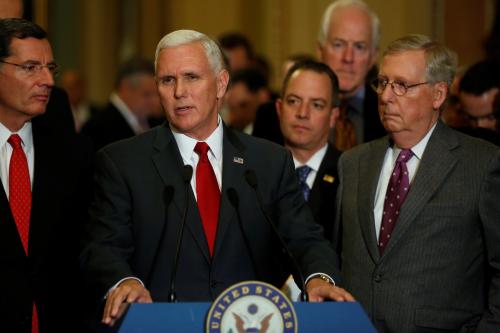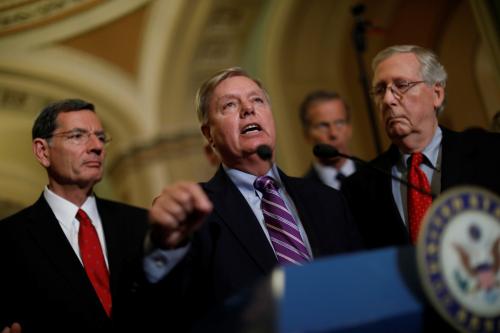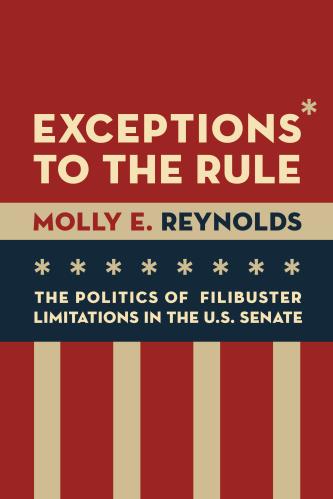With late night drama not often seen on the Senate floor, Republicans’ latest attempts to pass a bill repealing the Affordable Care Act failed last night, thanks in part to a divide the party’s congressional leaders, especially in the Senate, could simply not bridge.
In Congress, we expect that the majority party’s choices about what to work on and how to work on it will be guided, in large part, by their desire to maintain and grow their majority in the future. As the process went on over the past several months, it became increasingly clear that, for the current GOP leadership, what they thought was best for the party’s collective fortunes was adopting something that they could credibly claim “repeals Obamacare.” After all, doing so has been one of their central campaign promises since the law was adopted in 2010—and what helped account for some of their electoral success since that time. The content of the narrow bill to which Senate Republicans retreated in an attempt to keep the process moving reflects this priority, in that it contained symbolic provisions that would be easy for voters to understand as “Obamacare repeal” should the bill have ultimately become law. Chief among these provisions was the repeal of the requirement that individuals purchase health insurance, known as the individual mandate. This provision is among the law’s best known and the change in the Senate bill would have been easy for voters to understand. Under Obamacare, they were required to do something; under the Republican bill, they would not have been.
At the end of the day, however, individual Senate Republicans concluded that even if leaders had judged that “repealing Obamacare” was in the best interests of the party collectively, they could not support the different proposals drafted to actually get there. This was perhaps most true of Senators Susan Collins (R-Maine) and Lisa Murkowski (R-Alaska), who opposed beginning debate and all three alternative proposals considered this week. There were also, however, 11 other senators who voted no on at least one of the alternatives offered this week. While some of those votes may have been strategic, as members knew that the proposal would not ultimately be enacted, they do help illustrate the persistent divides within the Republican Party about the best way to proceed on health policy. In an era of high party polarization and a well-sorted electorate, this kind of cross-pressuring, where what’s good for the party is not necessarily good for the individual member, is less common than it once was. But as the experience of the last few months suggests, those situations can still and do arise.
While the choice by Republicans to pursue their collective goal of “repealing Obamacare” through the fast-track budget reconciliation process meant that Senate Majority Leader Mitch McConnell (R-Ky.) only needed to find 50 votes, it also constrained his task in important ways. The rules of the budget process, including the Byrd Rule, place restrictions on the content of reconciliation bills and amendments to them. While it can be difficult to know exactly how these rules shape a particular piece of legislation, one consequence of them is that leadership does not necessarily have as much room to maneuver in terms of deal-making as they might have on other bills. What’s more, by turning to a process that did not require the support of any Democrats to move forward, Republicans could not rely on the opposition of the other party as a useful foil while they sought to build a winning coalition. Instead, all attention was focused on the party’s internal conflicts and inability to reach agreement—a task made harder by the presence of a same-party president without the policy expertise or interest to help broker the necessary deals. Special legislative procedures that prevent filibusters, in sum, can help majority parties get legislative wins, but only if the party agrees internally on the policy particulars of what that win should look like.
As an agenda item, health care generally and Obamacare specifically aren’t going anywhere any time soon. The Children’s Health Insurance Program, which covered about 9 million children in 2016, needs to be reauthorized by the end of September, and uncertainty about the continued payment of certain subsidies for some Obamacare enrollees on the individual marketplace remains. But with a range of other major issues needing action in the coming weeks—including spending bills and the debt ceiling—Republicans appear ready to move on from their legislative pursuit of their biggest collective goal of recent years.
The Brookings Institution is committed to quality, independence, and impact.
We are supported by a diverse array of funders. In line with our values and policies, each Brookings publication represents the sole views of its author(s).











Commentary
Republicans learn the limits of reconciliation with failed ACA repeal
July 28, 2017